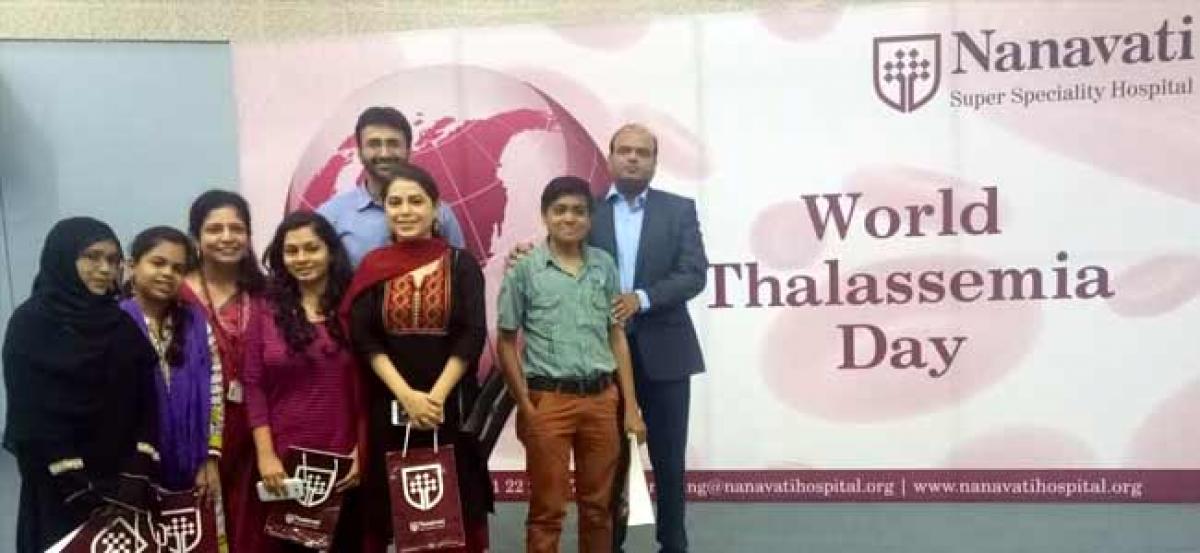Live
- All you need to know about PAN 2.0
- Akasa Air redefines travel experience with industry-first offerings
- MP: Residents stage protests against liquor shop in Indore
- Telugu Actor Shri Tej Booked for Alleged Cheating and False Promise of Marriage in Live-in Relationship
- Toyota Kirloskar Motor Celebrates 1 Lakh Urban Cruiser Hyryder on Indian Road
- MLS: New York City FC part ways with head coach Nick Cushing
- Delhi CM says Centre cutting AAP voters’ names from rolls, BJP hits back
- Hyderabad Metro Rail Phase-II Works to Begin in Old City in January 2025
- Odisha: 668 persons killed in human-elephant conflicts in last three years
- DEFENDER JOURNEYS: TO EMBARK ON ITS THIRD EDITION FROM NOVEMBER 2024
Just In
Improved blood transfusion and availability of bone marrow transplantation are key advances in treatment of thalassemia


Advancements in blood transfusion techniques and availability of bone marrow transplantation as the only curative treatment option are key to controlling thalassemia, stated medical experts associated with Nanavati Super Speciality Hospital (NSSH) on the occasion of World Thalassemia Day, May 8.
Advancements in blood transfusion techniques and availability of bone marrow transplantation as the only curative treatment option are key to controlling thalassemia, stated medical experts associated with Nanavati Super Speciality Hospital (NSSH) on the occasion of World Thalassemia Day, May 8. Thalassemia can broadly be defined as an inherited hematologic disorder caused by defects in one or more haemoglobin chains and is categorized into alpha thalassemia and beta thalassemia.
“India comes in the high danger thalassemia belt with a high number of the global thalassemia patients coming from the country. Twenty eight genetic mutations are prevalent in India. Education & awareness, community carrier screening, extended family screening, new-born screening, premarital screening and pre-pregnancy screening play a pertinent role in diagnosing the early diagnosis of thalassemia,”stated Dr. Nimish Kulkarni, Associate Consultant, Department of Haemoto-Oncology & Bone Marrow Transplant, NSSH.
A newborn carries a linked pair of beta globin genes from both parents. Defect in one can lead to beta thalassemia minor and defect in both leads to beta thalassemia major. Comparatively Alpha Thalassemia is relatively uncommon and those who are severely affected don’t survive at birth.
Commenting on the different variations of thalassemia, Dr. Niranjan Rathod, HOD, Haemato-Oncology Department, NSSH stated, “Beta thalassemia minor is largely asymptomatic. Testing of spouses for same defect is essential before planning children. The clinical complications of beta thalassemia intermedia is less severe than beta thalassemia major and the treatment regimen includes RBC transfusion for anaemia, hydroxyurea and iron chelation in selected patients. Beta thalassemia major is the extreme version and can be treated with blood transfusion, effective iron chelation, timely splenectomy and bone marrow transplant in patients having suitable HLA match donor. BMT is the only curative treatment option and has a high success rate to tune of 90% if done between 2-5 years.”
High end infrastructure and experts required for BMT is selectively available in speciality hospitals like Nanavati Hospital. Children with thalassemia are largely susceptible to osteoporosis. Such children should be encouraged to engage in moderate physical activity, intake of calcium, Vitamin D and zinc supplements. Smoking is best to be avoided.
“Improvement in transfusion medicine remains an ongoing process primarily focused at increasing safety of blood transfusions. There is an immediate need of voluntary non-remunerative blood donors to come forward and importance needs to be accorded to pre-blood donation counselling to prevent transmission of viral infections,”stated Dr. Rinku Bhatia, Head of Blood Transfusion Department, NSSH.

© 2024 Hyderabad Media House Limited/The Hans India. All rights reserved. Powered by hocalwire.com






